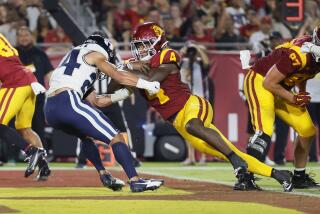USC’s Lane Kiffin starts again in Hawaii
- Share via
Reporting from Honolulu — Lane Kiffin insists he won’t be nervous.
Not today. Not after coaching the Oakland Raiders in the pressure cooker that is the NFL. Or at Tennessee in the football-mad Southeastern Conference.
USC’s first-year coach knows there are questions about him and his team as the 14th-ranked Trojans enter their opener against Hawaii. But don’t expect Kiffin to crumble under pregame anxiety.
Or even feel it.
“I don’t get it anymore,” he said.
He did five years ago, though, right here in this island paradise where he called plays for the Trojans for the first time.
Now that was a time to be nervous.
Kiffin was only 30 and Pete Carroll had handed him the keys to the Ferrari that was USC’s offense.
After Carroll nudged Norm Chow to the NFL, Kiffin and Steve Sarkisian took over as coordinators of a unit that had demolished Oklahoma in the previous season’s Bowl Championship Series title game.
Quarterback Matt Leinart was a Heisman Trophy winner, tailback Reggie Bush about to become one. All 11 starters were future NFL draft picks.
“The offense started talking about being the greatest show on Earth,” Kiffin said.
There was only one problem for Kiffin as the two-time national champion Trojans prepared for the Sept. 3, 2005, opener at Aloha Stadium. Jerry Glanville, a former NFL head coach, was the Warriors’ defensive coordinator.
“We’re going, ‘How did we draw Jerry Glanville our first game doing this?’ ” Kiffin recalled.
The specter of being stifled or embarrassed in their debut caused Kiffin and Sarkisian to hole up in the coaches’ offices late at night. They watched tapes of Glanville’s 1990s Atlanta Falcons teams for months. By the time USC arrived at its posh hotel in Hawaii, Kiffin was a wreck.
“We knew what was going to happen if we went out and scored [only] 30 points,” Kiffin said. “All the talk would be about Norm Chow and, ‘You kids don’t know what you’re doing.’
“We probably put that all on ourselves. My wife said that Hawaii trip was not one second of fun for her. She reminded me of that [recently]. She said I was miserable to be around.”
Kiffin wasn’t feeling any better by the time the Trojans arrived at the stadium.
“I remember the anxiety and anticipation of going out and thinking, ‘We’ve got all these scripts and we’re going to explode,’ ” he said. “What if we start going three yards a carry? These players are going to look at us like, ‘You told us we were going to be the greatest show ever.’ ”
It didn’t help when Trojans safety Darnell Bing intercepted a pass on the first series and returned it for a touchdown, giving the ball back to the Warriors. USC’s offense did not get onto the field until less than two minutes remained in the first quarter.
“It felt like forever,” Kiffin said.
Once Kiffin and the offense got an opportunity, though, it took off. USC won, 63-17. The Trojans went on to average 579.8 yards and 49.1 points a game during a season that ended with a BCS title-game loss to Texas.
The firepower and the way Kiffin deployed it drew many of the USC players who were high school seniors in 2005-06.
“It looked like they were having fun out there and it seemed like they were doing anything they wanted to,” said tailback C.J. Gable, a fifth-year senior. “You’re watching it and thinking that was something I wanted to be a part of.”
The Trojans offense that will take the field tonight is markedly different from the 2005 edition.
Quarterback Matt Barkley is a sophomore; Leinart was a fifth-year senior. Tailback Marc Tyler is starting a game for the first time, not starting his Heisman campaign like Bush, a finalist in 2004.
The 2005 team was coming off an unbeaten season that ended with its 55-19 BCS title-game rout of Oklahoma. USC salvaged a 9-4 record last season with an Emerald Bowl victory over Boston College.
“These guys don’t have that confidence yet because they haven’t experienced that success,” Kiffin said.
Kiffin, 12-21 as a head coach, intends to show them the way.
He will still call plays, but with a different outlook than when he was offensive coordinator.
“When you become a head coach your view completely changes because you are managing the game to win,” he said. “When you’re the offensive coordinator … it’s how many points can we score and how fast can we score them?”
Kiffin is striving for a balanced attack that features big-play capability. He hopes a defense led by a veteran front seven can create and capitalize on turnover opportunities, setting up the offense for momentum-turning touchdowns.
But don’t expect any proclamations about the greatest show on Earth.
Or for Kiffin to spend much time worrying about it.
“I’m different,” he said. “My ego, from a points standpoint and what they say about your offense, will never have any effect on how we call plays here.”
gary.klein@latimes.com
twitter.com/latimesklein
More to Read
Fight on! Are you a true Trojans fan?
Get our Times of Troy newsletter for USC insights, news and much more.
You may occasionally receive promotional content from the Los Angeles Times.







